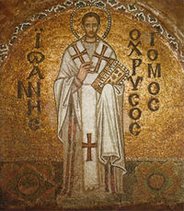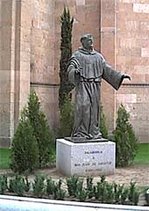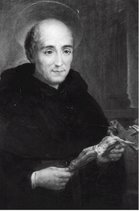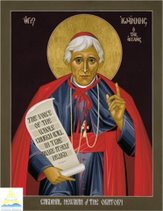A fable by Robert Louis Stevenson en español

Robert Louis (Balfour) Stevenson (November 13, 1850–December 3, 1894), was a Scottish novelist, poet and travel writer, and a representative of neo-romanticism in English literature. He was the man who "seemed to pick the right word up on the point of his pen, like a man playing spillikins", as G. K. Chesterton put it. He was also greatly admired by many authors, including Jorge Luis Borges, Ernest Hemingway, Rudyard Kipling, Vladimir Nabokov,[1] and J. M. Barrie.[2] Most modernist writers dismissed him, however, because he was popular and did not write within their definition of modernism. It is only recently that critics have begun to look beyond Stevenson's popularity and allow him a place in the canon.
Including:
Treasure Island (1883)
A Child's Garden of Verses (1885)
The Strange Case of Dr. Jekyll and Mr. Hyde (1886)
Los cuatro reformadores
Cuatro reformadores se encontraron bajo una zarza. Y estaban de acuerdo, eso sí, de que habría de cambiar el mundo.
-Tenemos que abolir la propiedad- dijo uno.
-Hay que aniquilar el matrimonio- dijo otro.
-Tenemos que acabar con Dios- dijo el tercero.
-Ojalá pudiéramos cargar con el trabajo- dijo el cuarto.
-No nos alejemos de política pragmática- dijo el primero. –La primera cosa será reducir al hombre a un nivel común.
-Primero habrá que darle libertad a ambos sexos- dijo segundo.
-Y antes de eso tendremos que averiguar cómo se hace- dijo el tercero.
-El primer paso será abolir la Biblia- dijo el primero.
-Primero habrá que arrasar las leyes- dijo el segundo
-Pero antes de todo habrá que acabar con la humanidad- dijo el tercero.
The Four Reformers
FOUR reformers met under a bramble bush. They were all agreed the world must be changed. “We must abolish property,” said one.
“We must abolish marriage,” said the second.
“We must abolish God,” said the third.
“I wish we could abolish work,” said the fourth.
“Do not let us get beyond practical politics,” said the first. "The first thing is to reduce men to a common level.”
“The first thing,” said the second, “is to give freedom to the sexes.”
“The first thing,” said the third, “is to find out how to do it.”
“The first step,” said the first, “is to abolish the Bible.”
“The first thing,” said the second, “is to abolish the laws.”
“The first thing,” said the third, “is to abolish mankind.”
(from Fables (1888))





















No comments:
Post a Comment